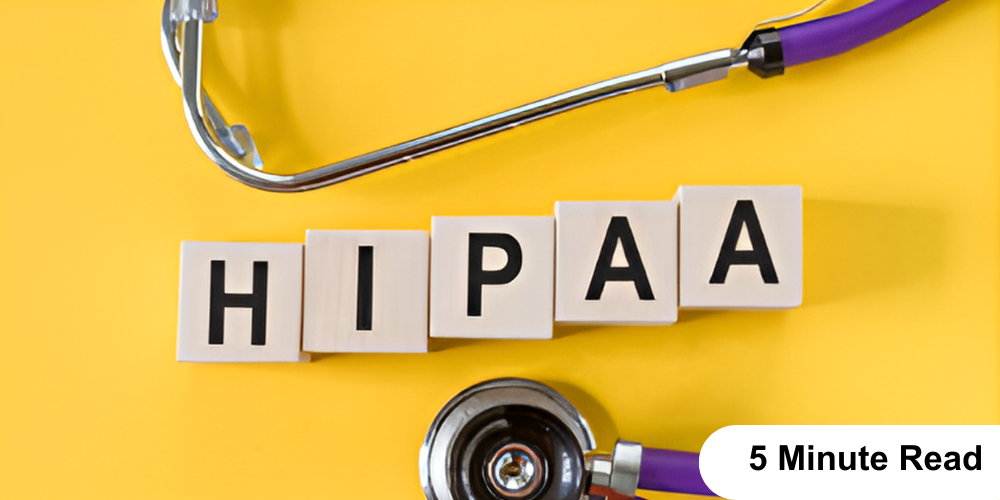THE TOP 10 DEVELOPMENT PRACTICES FOR HIPAA PROVIDERS IN 2024
The healthcare industry is one of the most heavily regulated sectors. It has stringent rules and regulations to protect patient privacy and data security. Among these regulations, the Health Insurance Portability and Accountability Act (HIPAA) protects sensitive health information.
As 2024 moves to the 4th month, HIPAA compliance remains a top priority for healthcare providers. This is because it necessitates the adoption of robust development practices to ensure adherence to regulatory requirements and mitigate security risks.
This article will discuss the top ten development practices for HIPAA providers in 2024. But first, let’s look at relevant statistics:
- Increasing Cyber Attacks: According to the HIPAA Journal, 133,068,542 healthcare records were hacked in 2023, representing a 156% rise over 2022 and more than double the number of data leaked in 2022 (51.9 million).
- Cost of Data Breaches: According to an IBM report, the average cost of a healthcare data breach in 2023 was $4.45 million. It’s a 15% increase in 3 years.
- Training and Education Impact: HIPAA Journal data suggests that more than 50% of employees working with PHI do not have a comprehensive understanding of HIPAA regulations. They require more training to understand the nitty-gritty of it.
These numbers highlight the need for robust development processes and proactive steps to maintain HIPAA compliance and secure sensitive patient data in healthcare cybersecurity.
Save Thousands Of Dollars With Coggno Prime Subscription
Now, look at the top 10 development practices for HIPAA providers in 2024.
SECURITY RISK ASSESSMENT
Regular security risk assessments are critical for HIPAA providers in identifying vulnerabilities and threats to their systems and data. Organizations can prevent security breaches by thoroughly assessing potential hazards. Identifying gaps in infrastructure, apps, and procedures allows healthcare providers to improve their security posture and maintain HIPAA compliance.
Risk Assessment And Management (Course)
ENCRYPTION AND DATA PROTECTION
Encryption protects sensitive data from illegal access and interception. HIPAA providers must use robust encryption mechanisms to safeguard the confidentiality and integrity of patient information. In particular, end-to-end encryption encrypts data at rest and in transit, minimizing the danger of exposure to malevolent actors.
Data Privacy And Cybersecurity Course
ACCESS CONTROL MEASURES
Effective access control restricts access to sensitive patient information to just authorized staff and strengthens access control mechanisms. Role-based access control (RBAC) enables businesses to set access rights based on user roles and responsibilities. It lowers the risk of data breaches caused by unauthorized access. Furthermore, implementing robust authentication techniques, such as multi-factor authentication, offers another layer of security.
REGULAR TRAINING AND EDUCATION
HIPAA compliance goes beyond technological measures and includes employee knowledge and training. Regular training sessions and educational programs are essential for updating employees on HIPAA requirements and best data privacy practices. Healthcare providers must enable employees to understand and successfully reduce possible security threats by fostering a culture of compliance and responsibility.
Must Read: 15 REASONS WHY COMPANIES SHOULD INVEST IN PROFESSIONAL DEVELOPMENT COURSES
SECURE COMMUNICATION CHANNELS
Secure chat systems and encrypted email are essential tools for HIPAA providers. Secure communication channels protect the confidentiality and integrity of sensitive information shared by healthcare professionals, patients, and other stakeholders. Implementing secure file transfer protocols improves data protection by reducing the possibility of data leakage or unwanted access.
HIPAA Privacy And Security Basics Course
INCIDENT RESPONSE PLANNING
Healthcare providers must have a thorough incident response strategy to manage and mitigate security breaches successfully. This strategy should include specific methods for identifying and recovering from security problems. By forming a well-defined incident response team and assigning specific roles and tasks, companies can ensure a coordinated and fast reaction to possible threats. Regular exercises and simulations are important for assessing the plan’s performance and finding areas for improvement.
Emergency Response Plan Course
VENDOR MANAGEMENT AND DUE DILIGENCE
Many healthcare providers rely on third-party suppliers and business partners to assist with various elements of their operations. However, outsourcing certain tasks adds extra security concerns. That is why businesses must do extensive due diligence when selecting and managing suppliers. This involves analyzing suppliers’ security policies, adding contractual requirements to guarantee HIPAA compliance, implementing methods for monitoring vendor performance and performing periodic audits.
SECURE CLOUD COMPUTING
The use of cloud computing technology provides various advantages to healthcare providers, including enhanced scalability, flexibility, and cost-effectiveness. However, transferring sensitive data to the cloud introduces security risks, necessitating the implementation of strong security measures and encryption techniques. Healthcare providers must carefully analyze cloud service providers’ compliance with HIPAA regulations and implement methods for continual monitoring and evaluation to maintain data security in the cloud.
DATA BACKUP AND DISASTER RECOVERY
Data loss has serious ramifications for healthcare professionals, jeopardizing patient treatment and eroding confidence. Organizations must adopt strong data backup and disaster recovery policies to reduce this risk. These policies involve periodically backing up key data and storing it in off-site locations or redundant systems to assure its availability in the case of a breach or tragedy. Regularly testing backup and recovery procedures is critical for ensuring their efficacy and minimizing downtime in the case of an emergency.
CONTINUOUS COMPLIANCE MONITORING
HIPAA compliance is an ongoing commitment that necessitates constant monitoring and review. Healthcare providers can use automated tools and solutions to streamline compliance monitoring operations. This will also help them detect possible noncompliance concerns in real-time. Furthermore, prioritizing continuous compliance monitoring allows healthcare providers to detect and repair security weaknesses proactively, reducing the risk of data breaches and regulatory fines.
END NOTE
Adhering to HIPAA requirements necessitates a diverse strategy with strong development processes and continuous awareness. Adopting the above development practices will help healthcare professionals maintain patient confidentiality and comply with regulatory norms.
MEET YOUR TRAINING NEEDS FROM COGGNO
Coggno offers a range of HIPAA training for healthcare professionals to stay ahead. Visit our marketplace page and see for yourself.
Maximize Training, Minimize Costs With Coggno Prime








